

Mathematics. New York State Mathematics Curriculum Modules for Grades P-12 Connecting the Standards for Mathematical Practice to the Standards for Mathematical Content The Standards for Mathematical Practice describe ways in which developing student practitioners of the discipline of mathematics increasingly ought to engage with the subject matter as they grow in mathematical maturity and expertise throughout the elementary, middle and high school years.
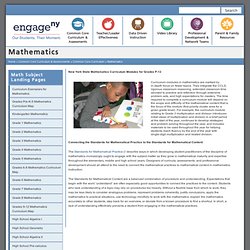
Designers of curricula, assessments, and professional development should all attend to the need to connect the mathematical practices to mathematical content in mathematics instruction. Implementing the Mathematical Practice Standards. Common Core high school math standards. CCSS.Math.Content.HSN Number and Quantity CCSS.Math.Content.HSA Algebra.
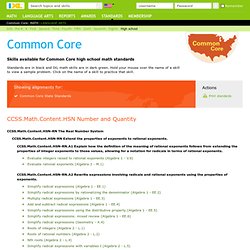
Templates, Tools, and Resources - Achievement Strategies, Inc. - Dr. Bobb Darnell. Center for the Study of Mathematics Curriculum. Www.caboces.org/sites/default/files/A Common Core/ContentPriorities-2011-05-31-1212.pdf. MVP - Mathematics Vision Project (MVP) Wp-content/uploads/2012/12/ccss_progression_algebra_2012_12_04.pdf. Bill McCallum. About Bill McCallum I was born in Australia and came to the United States to pursue a Ph.
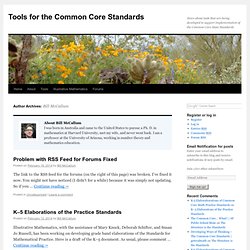
D. in mathematics at Harvard University, met my wife, and never went back. I am a professor at the University of Arizona, working in number theory and mathematics education. Problem with RSS Feed for Forums Fixed. Common Core Resources. KATM Supports the Implementation of the Common Core State Mathematics Standards NCSM position paper Kansas Common Core Myths and Facts Websites, files, and discussion related to the Common Core State Standards: PPTX VIEWER for Windows PDF VIEWER for Windows.
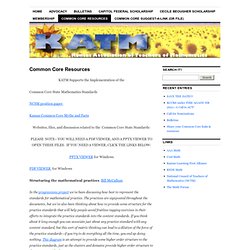
CCSSTOOLBOX.COM. Math-Content-Specifications. The Five Strands of Mathematics. (1) Conceptual understanding refers to the “integrated and functional grasp of mathematical ideas”, which “enables them [students] to learn new ideas by connecting those ideas to what they already know.”
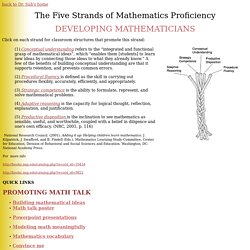
A few of the benefits of building conceptual understanding are that it supports retention, and prevents common errors. (2) Procedural fluency is defined as the skill in carrying out procedures flexibly, accurately, efficiently, and appropriately. (3) Strategic competence is the ability to formulate, represent, and solve mathematical problems. (4) Adaptive reasoning is the capacity for logical thought, reflection, explanation, and justification. (5) Productive disposition is the inclination to see mathematics as sensible, useful, and worthwhile, coupled with a belief in diligence and one’s own efficacy. National Research Council. (2001). For more info. Www.mathedleadership.org/docs/events/webinars/NCSMCCSSWebinar2011-02-23Presentation.pdf.
CCSS-Math Professional Development. Mathematics is often referred to as the gatekeeper school subject.
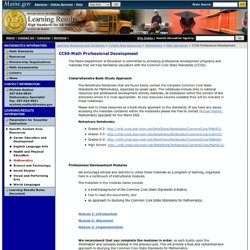
Careers in science, technology, engineering and mathematics (STEM) related fields are some of the highest wage, highest growth areas in Maine. Furthermore, STEM knowledge is a critical ingredient to developing informed citizens. By increasing understanding in these areas, the Maine Department of Education seeks to support gains in student mathematics achievement and aspirations to pursue STEM careers. As part of the Maine DOE’s commitment to supporting schools in the delivery of effective K-12 mathematics instructional programs, this site provides teachers, administrators, non-profits, higher education faculty, parents and community members with a broad range of resources reflective of Maine’s learning standards.
THE COMMON CORE IN MATHEMATICS: Overview. Illustrativemathematics.org. Reasoning and Sense Making Task Library. Custom Apps. Welcome to the Inside Mathematics Website. Common Core State Standards for Mathematics. Smarter Balanced Assessment Consortium. Achievement Level Descriptors and College Readiness. Achievement level descriptors (ALDs) articulate the knowledge, skills, and processes expected of students at different levels of performance on the Smarter Balanced assessments.
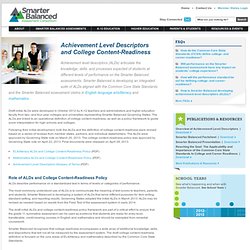
Smarter Balanced is developing an integrated suite of ALDs aligned with the Common Core State Standards and the Smarter Balanced assessment claims in English language arts/literacy and mathematics. Draft initial ALDs were developed in October 2012 by K-12 teachers and administrators and higher education faculty from two- and four-year colleges and universities representing Smarter Balanced Governing States.
The ALDs are linked to an operational definition of college content-readiness, as well as a policy framework to guide score interpretation for high schools and colleges. Following their initial development, both the ALDs and the definition of college content-readiness were revised based on a series of reviews from member states, partners, and individual stakeholders. Sample Items and Performance Tasks. Smarter Balanced sample items illustrate the rigor and complexity of the English language arts/literacy and mathematics items and performance tasks students will encounter on the Consortium’s next-generation assessments.
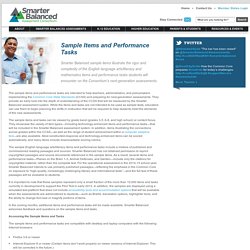
Modese model curriculum units. Welcome to the Mathematics Assessment Project. News New – TRU Math: Teaching for Robust Understanding of Mathematics is a suite of tools for professional develompent and research - the alpha versions of these documents are available here… More International Awards for Team: Hugh Burkhardt and Malcolm Swan, leaders of the Shell Centre team, have been chosen by the International Commission on Mathematical instruction (ICMI) as the first recipients of the Emma Castelnuovo Medal for Excellence in the Practice of Mathematics Education.

This complements the award by ICMI to Alan Schoenfeld of the 2011 Felix Klein Medal for Lifetime Achievement in research. Read more…